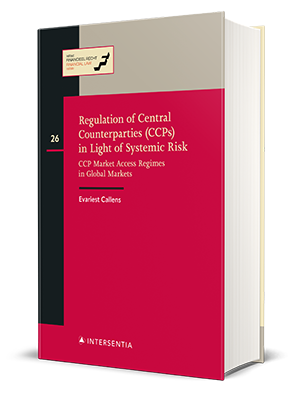| Interview |


Author speaking: Evariest Callens
Evariest Callens is a Postdoctoral Researcher at the Financial Law Institute of Ghent University.
He holds a Master in Law, a Complementary Master of Science in Economics, and a PhD in Law, all from Ghent University.
What are CCPS?
A central counterparty (CCP) is a legal entity that interposes itself between the initial counterparties to the contracts traded on one or more financial markets, becoming the buyer to every seller and the seller to every buyer. This means that, after CCP interposition, two mirroring legally binding contracts come into existence between the CCP and the respective entities on both sides of the transaction. From a functional perspective, any payments that would have fallen due between the initial counterparties are now transmitted through the CCP, i.e. rather than directly paying each other, counterparties funnel their payments through the CCP.
What is their function?
If a CCP interposes itself into a financial transaction, the initial counterparties to the transaction are shielded from the direct repercussions of their initial counterparty’s failure to meet its contractual obligations. Indeed, as the contractual counterparty of both initial parties to the transaction, the CCP will bear the financial consequences of the default of one of these initial counterparties. Hence, through the usage of a CCP, market participants aim to guarantee that, upon default of one or multiple market participants, non-defaulting market participants will still face a performing counterparty. Economically, a CCP may thus be regarded as a ‘commitment mechanism’ seeking to assure performance of contractual obligations.
Why are they important?
In the aftermath of the 2008 financial crisis, international policymakers have successfully pushed for increased usage of CCPs. Although CCPs seek to discharge the destructive forces that certain financial transactions may entail, the risk centralization that is inherent to CCPs may increasingly constitute a latent but major source of macro risk in financial markets. Against this backdrop, CCPs have been rightfully labeled as the ‘nuclear powerhouses’ of modern financial markets. Trillions of euros now change hands through these institutions every year.
Why do they need effective regulation and what are the risks of not having it?
A major calamity at a systemically important CCP could ignite financial and economic crises. In the absence of adequate regulation, CCPs could collapse themselves and, hence, fail to perform their buffer function against counterparty risk and default, allowing systemic risk to spread through the financial and economic system.
How is the European Union regulating them?
In the EU, the European Market Infrastructure Regulation (EMIR) and the CCP Recovery and Resolution Regulation contain a wide range of measures that aim to guarantee that CCPs operate smoothly. Similarly, in the US, a comprehensive set of rules and principles is in place that seeks to prevent CCPs becoming a source of systemic risk themselves. A crucial element of the legislative and regulatory framework for CCPs is the regime that determines the conditions under which domestic and foreign CCPs may obtain access to the market for clearing services in a given jurisdiction, i.e. the conditions under which CCPs may provide clearing services to the entities established (or persons residing) in that jurisdiction. Prior to Brexit, the EU maintained a relatively liberal system in which third country CCPs could provide clearing services to EU clearing members and trading venues through compliance with home country rules and supervision. However, in response to Brexit, this regime has been fundamentally reformed. Currently, systemically important third country CCPs have to comply with EMIR and are subject to supervision by the European Securities and Markets Authority (ESMA). This comes on top of compliance with home country rules and home country supervision. Furthermore, the European Commission may decide that certain third country CCPs are of such substantial systemic importance that they are prohibited from providing clearing services to EU clearing members and trading venues.
What about the United States?
The recent reforms in the EU run contrary to the direction of travel in the US, which has altered its (traditionally rather strict) legislative and regulatory framework with a view to relaxing the conditions under which foreign CCPs can provide clearing services in US markets.
Is it sufficient?
Although financial stability concerns are legitimate and the EU is certainly in a specific situation (with large volumes of euro-denominated transactions being cleared in London), it could be argued that the post-Brexit reforms in relation to third country CCPs may partly work against EU financial stability in that they may ultimately lead to market and liquidity fragmentation, especially if certain third country CCPs were to be prohibited to serve EU markets.
What is your main proposal for the near future?
The book argues that certain elements of the current EU regime for third country CCPs should be reformed in order to avoid market and liquidity fragmentation.
About the book


Regulation of Central Counterparties (CCPs) in Light of Systemic Risk
Against the background of the economic dynamics of financial markets, this book examines the EU regulatory and supervisory framework for central counterparties (CCPs) that clear derivative contracts.
Evariest Callens
April 2022
ISBN 9781839702402